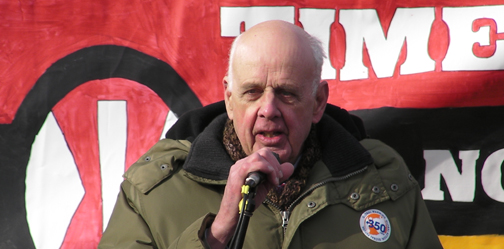February 12, 2011-by Jeff Biggers in the Huffington Post.
As the nation’s beloved author/farmer philosopher Wendell Berry settled his 76-year-old lanky frame onto the floor of Kentucky Gov. Steve Beshear’s office last night, he picked up a copy of The Tempest. But in joining other protesters in this extraordinary sit-in to halt reckless mountaintop removal mining, including a coal miner and inspector who dedicated 40 years of his life to the industry, a Harlan County activist whose brother was killed in a mine, a nurse who has served black lung-affected coal miners for decades, and some of the country’s top Appalachian labor and history scholars, Berry was not taking part in any Shakespeare spectacle.

Wendell Berry has become an icon against the devastation of Mountain Top Removal Mining in recent years. Here, he is speaking to people seeking to get arrested outside the Capitol Hill power plant in March 2009. Photo© 2009 John Blair
When Prospero commands in the classic play, “We are such stuff, as dreams are made on,” Kentuckians, who have lived among the ravages of strip-mining for a century–and mountaintop removal operations since 1970–were making it clear that they can no longer wait for the elusive dream of coalfield justice and democracy in their own homeland of central When Martin Luther King wrote his game-changing letter for the Civil Rights movement on the need for civil disobedience, “Why We Can’t Wait” from the Birmingham, Alabama jail in 1963, the neighbors and families of these same Kentuckians were already in the throes of a growing movement to stop the devastation from unyielding and increasingly lawless strip-mining operations.
While King sought “to create a situation so crisis-packed that it will inevitably open the door to negotiation,” besieged strip-mined residents in Knott County in eastern Kentucky organized their own sit-ins and protests to keep unchecked strip-miners from destroying their historic homelands and hillsides and watersheds. They exclaimed to the world: “We feel we have been forsaken.”
As early as 1965, a 50-car convey of coalfield residents made the same trek as today’s protesters to the governor’s office in Frankfort, and called on him to enact enforceable laws to keep absentee coal companies from “ruining our farms and fields and streams.”
Yesterday’s meeting between the sit-in activists and Gov. Steve Beshear revealed the state’s still astonishing denial of the human, environmental and economic cost of coal placed on the shoulder of its coalfield citizens. Beshear refused to acknowledge any of the impacts from strip-mining, including the widely documented irreversible and pervasive destruction of federally-protected waterways from mountaintop removal dumping. He dismissed the EPA as a meddler in state affairs.
Later in the day, Beshear’s administration was symbolically reprimanded by a circuit court judge in his decision to include citizen participation in a stunning case of coal industry fraud and violation over the Clean Water Act. Beshear’s administration had attempted to dismiss the citizens groups as “unwarranted burdens.”
In one of the most poignant moments in the meeting, eastern Kentucky coalfield resident Rick Handshoe said to the governor: “I pay a higher electric bill than you: I pay my electric bill, and I pay with my family’s health, my nephew’s health. We pay a bigger price. We’re paying with our lives there.” (Go to Original)
